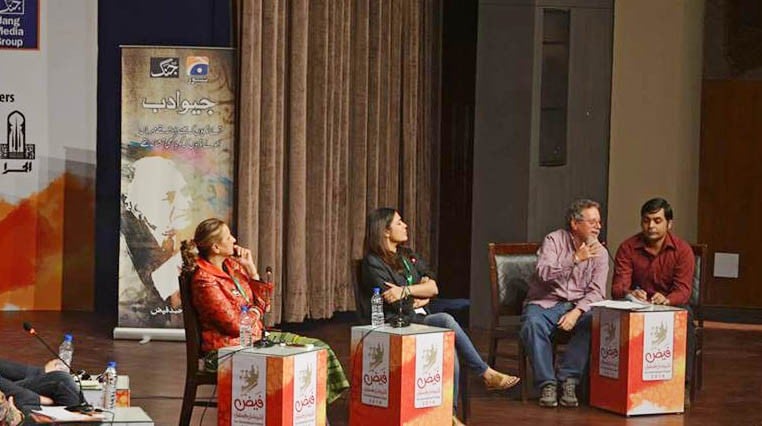
Star power was on full show at the FIF ‘16, as the festival activities veered towards all things cinema, chiefly of popular variety

As dense clouds bid a welcome farewell to the streets of Lahore, the language of intellection has once more returned in its stead. The recently concluded Faiz International Festival 2016 brought together artists and intellectuals from around the world for a weekend of introspection and reflection.
The buzz around Pakistan’s nascent and revivalist cinema industry is still not lost on festival organizers, but Sarmad Khoosat and Mira Hashmi conducted a panel discussion on the power of film that brought together Firdoze Bulbulia, a South African filmmaker of Indian descent, and our very own Mehreen Jabbar. A last-minute addition to the panel was Alex Faleites, a poet from Cuba who added a unique perspective to the proceedings and expanded the scope of the discussion to films as a medium.
The panelists quickly dived into the nuance of the matter -- the power to do what? Jabbar, who has had a wide breadth of experience with the medium, felt that at a fundamental level, films have the power to motivate. Sure, they entertain and educate, but by engaging the audience in a sensory experience that includes visuals and sounds as well as requiring an emotional investment from the audience, they are uniquely poised to impact their audiences in a holistic manner.
Bulbulia, whose film Cry of Love was showcased at the festival, spoke of the limitations of films. She recounted her experiences filming children from various parts of Africa, through which she got to meet young child warriors, drug addicts and the like. While visiting a young AIDS patient she recalled how helpless she had felt when she could smell the "stench of death" in the room -- of what use was her camera to the child? Such experiences in her life have resulted in her emphasis on what she called ‘edu-tainment.’ That people need a break from the bleak reality of life means that films must serve the need for diversion, too.
Read also: The spirit of Faiz
But recitations, readings and high-brow thoughts only fill out half a hall at Alhamra at best. The only way to witness a mad-rush would be to have two of Pakistan’s most popular Khans -- Mahira and Fawad -- show up. I had the chance to somehow work my way through the mayhem and attend Fawad Khan’s interview with Adeel Hashmi.
In the hall were fans, aunties, teenagers and more than a few jealous husbands. Many were left wanting as the hall filled to capacity well before Khan got on stage to make a rare public appearance. The musician-turned-actor guardedly opened up as he spoke on a variety of subjects including growing up in Lahore in the 1990s, and the stress and implications of fame.
He did well to admit ignorance of Faiz’s work at the outset, which put the audience in a forgiving mood, so that they overlooked a mistake or two in the actor’s recitation of ‘Hum ke thehre ajnabi’. His deep voice, though, did have the girls inside Alhamra’s Hall II swooning.
Fawad’s answers seemed calculated yet genuine. When asked what were the happiest moments of his life, the actor made the audience very happy by mentioning the birth of his two children. He was quick to add the day of his marriage to the list. I am sure his wife wouldn’t complain about this minor oversight, considering he named her as his biggest inspiration soon after.
The conversation eventually moved to the elephant in the room. When asked about the way he was treated across the border, Fawad was quick to humanise "the other." He said on the whole his experience had been memorable and that the friendships he had made over the course of the last two years were genuine and heartfelt.
On the issue of the ‘unofficial’ ban on Pakistani artistes in India, Fawad lamented the current situation but pointed out that there is a nationalist push in all countries, including our own.
He received markedly low applause when he pointed out that patriotism and fear of the other can often result in inbred thought, which can lower the standard of political and social discourse in a country.
His upcoming projects include a remake of the iconic Maula Jutt, as well as the eponymous role in legendary Pakistani singer Alamgir’s biopic Albela Rahi.
With Bollywood out of the picture for now, whether Khan will look to the West was a question Hashmi forced into the conversation. But there was no denial; so are we to expect a Fawad Khan Hollywood starrer? I sure hope so.
Many say Lahore sees all four seasons. Lahoris know fully well, however, that this assertion is false. Hidden behind the changing weather patterns are many more: There is the ‘Lawn Season,’ the ‘Shaadi Season,’ the ‘Mango Season’… and so on. But it’s good to see that the ‘Festival Season’ too has become a feature of Lahore’s social calendar.